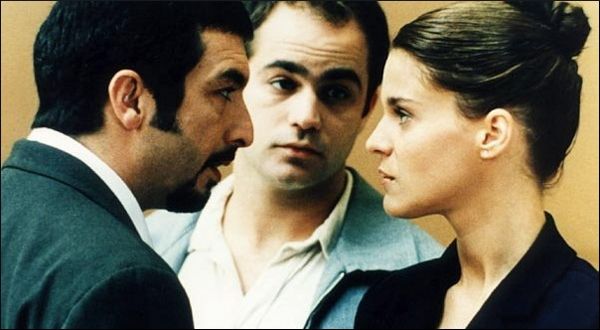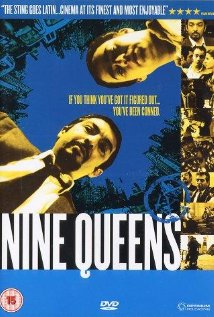Since its release in 2000, Fabián Bielinsky’s Nine Queens has managed to please everyone: critics, international audiences, and local viewers. It mixes popular genre conventions – recognizable to anyone who has ever seen a crime movie – with specifically Argentine quirks and idiosyncrasies. Which means this quick-footed film, asides from being supremely popular in its home country, is also ideal for English-speakers looking for an accessible entry point into South American cinema.

The plot gets going immediately, and never lets up until the final minute. It opens with Juan, a young con artist, as he fumbles a scam in a convenience store. He is saved by another, more experienced con artist, Marcos, who just happened to be nearby, unbeknownst to Juan, and who intervenes and pretends to be a policeman when the store clerks wise up to the swindle. Thus do both men get to know each other, and during the next 24 hours, they will become partners and carry out a complicated con together, selling counterfeit stamps – modeled on the rare Nine Queens of the title – to a wealthy Spaniard.
A great deal of the movie’s charm depends on the chemistry between the male protagonists. Ricardo Darín plays Marcos, in a performance that cemented his place as Argentina’s most dependable leading man. Previously, local audiences had known him for his more romantic and youthful turns, both on television and in film. As the goateed, veteran con man in Nine Queens, he revealed a different face: cynical, grumpy, older, and streetwise. Moviegoers ate it up, and he’s been repeating versions of the same role ever since. Fresh-faced Gastón Pauls, as Juan, is Marcos’ perfect foil. He’s younger, energetic, and naïve. Of course, this being a movie about cons and swindles, not everything is what it seems.
"This quick-footed film, asides from being supremely popular in its home country, is also ideal for English-speakers looking for an accessible entry point into South American cinema."
If we identify with the criminal protagonists, that is partly due to genre expectations, which require us to root for the outlaws. Nevertheless, in American films of the same type, we are often reminded that “stealing is bad” (because the main characters land in jail or die) or we are convinced that stealing is justified, because the victims are either despicable or hideously rich. Nine Queens, on the other hand, is not so anxious to stake a moral position, and instead simply observes the con men as they work. Only near the end is a subtle message imparted: during a subway trip, Juan gives a beggar boy the option between money or toys, suggesting that obsession with money is learned during childhood and might be unlearned at the same age, if only society were different. Bielinsky seems to say, in this brief sequence, that crime is not an individual sin but a larger social problem.

The characters in Nine Queens speak very much like real people in Buenos Aires, where the film was shot. Certainly, Argentine cinema has earlier examples of naturalistic dialogue, going back to the beginning of the sound era. But it has historically been plagued by stuffy, affected accents and vocabulary, especially since the 1940s, when Argentina began massively exporting its film products to the rest of South America and Spain. In order to not alienate foreign Spanish-speaking audiences, characters in Argentine movies adopted a neutral sort of Spanish, like a South American version of Transatlantic English. However, in the late 90s, film dialogue began to more frequently imitate common everyday talk, and Nine Queens followed this trend. Marcos and Juan exchange typically Argentine insults and slang, use “vos” instead of “tu” as the second person pronoun, and their accent reveals the Italian (particularly Neapolitan) influence that characterizes local speech (while the old, affected style steered closer to Spain). Those hoping to learn practical Argentine Spanish could do worse than Bielinsky’s crime caper, soaked as it is in the kinetic, urban poetry of Argentina’s capital city.




